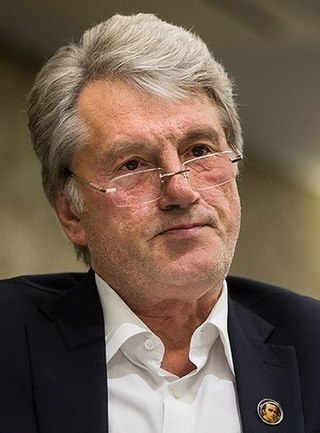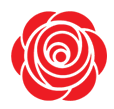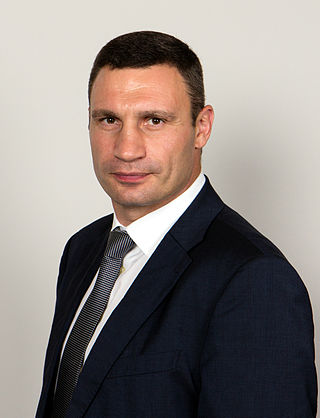Related Research Articles

Leonid Danylovych Kuchma is a Ukrainian politician who was the second president of Ukraine from 19 July 1994 to 23 January 2005. Kuchma's presidency saw numerous corruption scandals and the lessening of media freedoms.

The Our Ukraine–People's Self-Defense Bloc was an electoral alliance active in Ukraine from 2001 until 2012, associated with former President Viktor Yushchenko. Since 2005, the bloc had been dominated by a core consisting of the People's Union "Our Ukraine" party and five smaller partner parties. On 17 November 2011, the Ukrainian Parliament approved an election law that banned the participation of blocs of political parties in parliamentary elections. Since then several members of the Bloc have since merged with other parties.

Georgiy Ruslanovych Gongadze was a Georgian-Ukrainian journalist and film director who was kidnapped and murdered in 2000 near Kyiv. He founded the online newspaper Ukrainska Pravda along with Olena Prytula in 2000.

Leonid Makarovych Kravchuk was a Ukrainian politician and the first president of Ukraine, serving from 5 December 1991 until 19 July 1994. In 1992, he signed the Lisbon Protocol, undertaking to give up Ukraine's nuclear arsenal. He was also the Chairman of the Verkhovna Rada and a People's Deputy of Ukraine serving in the Social Democratic Party of Ukraine (united) faction.

Viktor Andriyovych Yushchenko is a Ukrainian politician who was the third president of Ukraine from 23 January 2005 to 25 February 2010. He aimed to orient Ukraine towards the West, towards the European Union and NATO.

Volodymyr Mykhailovych Lytvyn is a Ukrainian politician best known for being Chairman of the Verkhovna Rada, the Ukrainian parliament. Having previously served in that position from 2002 until 2006, he was re-elected in December 2008 after his party agreed to join the former coalition of Yulia Tymoshenko in an expanded capacity and stayed Chairman until December 2012. From 1994 to 1999, Lytvyn was the aide to President Leonid Kuchma and, later, the head of his office.

Oleksandr Oleksandrovych Omelchenko was a Ukrainian politician who served as mayor of Kyiv, the capital of Ukraine, first elected in 1999. Running for a third term he lost his re-election bid in March 2006. Omelchenko was also a People's Deputy of Ukraine from 2007 to 2012.

Ukraine without Kuchma was a mass protest campaign that took place in Ukraine in 2000–2001, demanding the resignation of President Leonid Kuchma, and preceding the Orange Revolution. Unlike the Orange Revolution, Ukraine without Kuchma was effectively extinguished by the government enforcement units, and followed by numerous arrests of the opposition and the Ukrainian-speaking participants. Seeking the criminal responsibility for those events was renewed with the election of Viktor Yanukovych as the President of Ukraine.

The Social Democratic Party of Ukraine (united) (Ukrainian: Соцiал-демократична партія України (об'єднана); СДПУ(о)), is a Ukrainian political party that was originally established as the Social Democratic Party of Ukraine. At the 1998 and 2002 parliamentary elections it won parliamentary seats, but has since then failed to win any seats. When in the Verkhovna Rada the party was influential, but since the Orange Revolution (of late 2004) it has been marginalized.
Hero of Ukraine is the highest national decoration that can be conferred upon an individual citizen by the President of Ukraine.

Yuriy Ivanovych Yekhanurov is a Ukrainian politician who was Prime Minister of Ukraine from 2005 to 2006 and Minister of Defense from 2007 to 2009.

The Head of Kyiv City, unofficially and more commonly the Mayor of Kyiv, is a city official elected by popular vote who serves as a head of the Kyiv city state administration and a chairperson the Kyiv City Council.

Volodymyr Stelmakh — banker, economist, politician and Governor of the National Bank of Ukraine from January 21, 2000 – December 17, 2002 and December 16, 2004 – December 23, 2010.

The president of Ukraine is the head of state of Ukraine. The president represents the nation in international relations, administers the foreign political activity of the state, conducts negotiations and concludes international treaties. The president is directly elected by the citizens of Ukraine for a five-year term of office, limited to two terms consecutively.
Industrial Union of Donbas is one of the biggest corporations in Ukraine. It is a horizontally integrated holding company that owns or directs stocks of 40 industrial enterprises in the East Ukraine, Hungary, and Poland. The company was created in 1995 and before the appearance of SCM Holdings in 2000 was a major steel rolling corporation in the East Ukraine. According to Interfax, ISD produces 9.2 million of steel annually. In 2012 World Steel Association ranking the corporation placed 33rd sharing it with JSW Steel Ltd.

The militsiya in Ukraine was a type of domestic law enforcement agency (militsiya) from 1917 until 2015. The militsiya was originally formed while Ukraine was governed by the Ukrainian Soviet Socialist Republic, part of the Soviet Union, and it continued to serve as a national police service in post-Soviet Ukraine until it was replaced by the National Police of Ukraine on 7 November 2015. The militsiya was under the direct control of the Ministry of Internal Affairs, and it was widely seen as corrupt and inconsiderable to the demands of the Ukrainian public. During Euromaidan, the Militsiya was accused of brutality against protestors as well as kidnapping Automaidan activists, leading to the reputation of the Militsiya being irreversibly damaged. This resulted in its replacement under the post-Maidan Poroshenko presidency.

The 60th Anniversary of the Liberation of Ukraine was a celebration in Kyiv, Ukraine on October 27–28, 2004 on the occasion of the 60th anniversary of the liberation of Ukraine from the Nazi Invaders. It was notable in that it was timed to the 2004 Ukrainian presidential election that occurred a week later. It was the first time the anniversary was celebrated since independence.

2003 Tuzla Island conflict was a crisis in Russia–Ukraine relations at the end of 2003 caused by disputes over the ownership of Tuzla Island and the construction by Russia of a dam in the Kerch Strait to Tuzla Island. The dispute raised fears of an armed confrontation.

The Kyiv Seven, also referred to as the Magnificent Seven, and the Kyiv Clan were two interrelated economic and political groups in Ukraine during the 1990s and early 2000s. The term "Kyiv Seven" refers to a group of Ukrainian oligarchs who wielded significant financial and political power in Ukraine during the late 1980s and 1990s. As the name suggests, it comprised seven members: Viktor Medvedchuk, Valentyn Zghursky, Hryhoriy and Ihor Surkis, Bohdan Hubskyi, Yuriy Karpenko, and Yuriy Liakh. The term "Kyiv Clan" more broadly refers to the groups which operated under the Seven's leadership. These groups were one of three large political clans in Ukraine during the presidency of Leonid Kuchma, alongside Kuchma's own Dnipropetrovsk Clan and the Donetsk Clan of Rinat Akhmetov and Viktor Yanukovych, among others.
References
- ↑ "Mr Hryhoriy OMELCHENKO (Ukraine)". Council of Europe. Retrieved 8 July 2023.
- ↑ "Yuschenko awards Hero of Ukraine title to member of parliament Hryhoriy Omelchenko - Feb. 18, 2010". Kyiv Post. February 18, 2010.
- ↑ Kupchinsky, Roman. "Analysis: Kuchma's Ukraine Cruises Back Into The Spotlight". Radiofreeeurope/Radioliberty.
- ↑ "Ukraine: Lawmaker Claims Evidence Of Arms Deals With North Korea, Iran". Radio Free Europe/Radio Liberty. April 9, 2008 – via www.rferl.org.
- ↑ "Radio Free Europe / Radio Liberty". www.infoukes.com.
This article needs additional or more specific categories .(July 2023) |